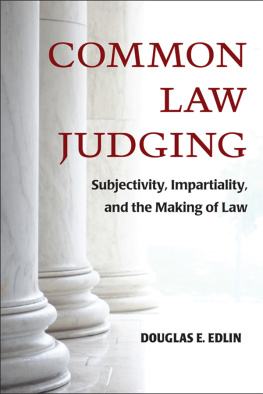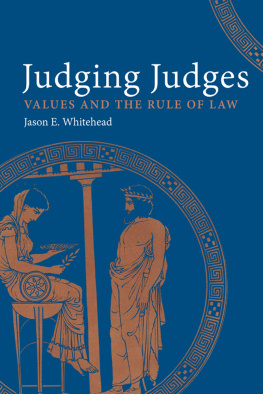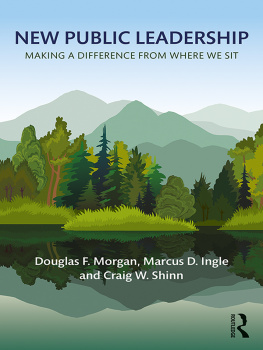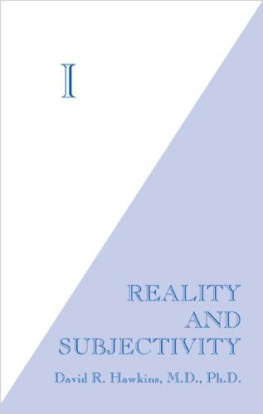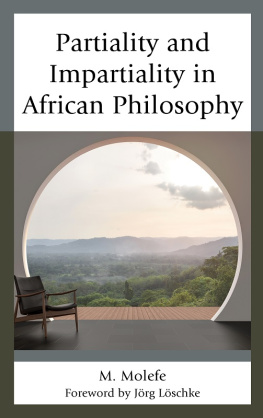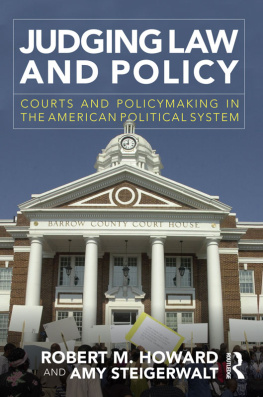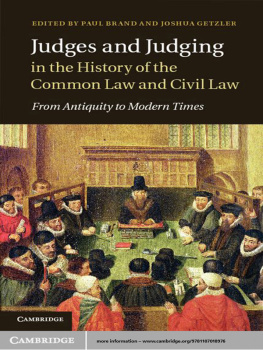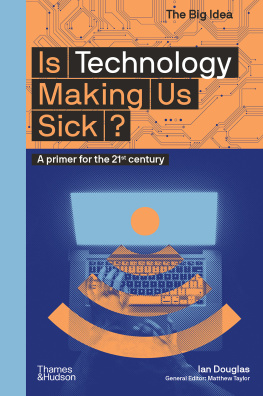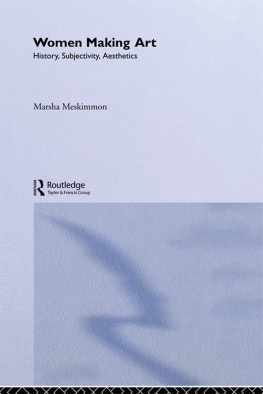Douglas E. Edlin - Common Law Judging: Subjectivity, Impartiality, and the Making of Law
Here you can read online Douglas E. Edlin - Common Law Judging: Subjectivity, Impartiality, and the Making of Law full text of the book (entire story) in english for free. Download pdf and epub, get meaning, cover and reviews about this ebook. year: 2018, publisher: University of Michigan Press, genre: Romance novel. Description of the work, (preface) as well as reviews are available. Best literature library LitArk.com created for fans of good reading and offers a wide selection of genres:
Romance novel
Science fiction
Adventure
Detective
Science
History
Home and family
Prose
Art
Politics
Computer
Non-fiction
Religion
Business
Children
Humor
Choose a favorite category and find really read worthwhile books. Enjoy immersion in the world of imagination, feel the emotions of the characters or learn something new for yourself, make an fascinating discovery.
- Book:Common Law Judging: Subjectivity, Impartiality, and the Making of Law
- Author:
- Publisher:University of Michigan Press
- Genre:
- Year:2018
- Rating:4 / 5
- Favourites:Add to favourites
- Your mark:
- 80
- 1
- 2
- 3
- 4
- 5
Common Law Judging: Subjectivity, Impartiality, and the Making of Law: summary, description and annotation
We offer to read an annotation, description, summary or preface (depends on what the author of the book "Common Law Judging: Subjectivity, Impartiality, and the Making of Law" wrote himself). If you haven't found the necessary information about the book — write in the comments, we will try to find it.
Douglas E. Edlin: author's other books
Who wrote Common Law Judging: Subjectivity, Impartiality, and the Making of Law? Find out the surname, the name of the author of the book and a list of all author's works by series.
Common Law Judging: Subjectivity, Impartiality, and the Making of Law — read online for free the complete book (whole text) full work
Below is the text of the book, divided by pages. System saving the place of the last page read, allows you to conveniently read the book "Common Law Judging: Subjectivity, Impartiality, and the Making of Law" online for free, without having to search again every time where you left off. Put a bookmark, and you can go to the page where you finished reading at any time.
Font size:
Interval:
Bookmark:
 Page i
Page i Are judges supposed to be objective? Citizens, scholars, and legal professionals commonly assume that subjectivity and objectivity are opposites, with the corollary that subjectivity is a vice and objectivity is a virtue. These assumptions underlie passionate debates over adherence to original intent and judicial activism.
In Common Law Judging, Douglas Edlin challenges these widely held assumptions by reorienting the entire discussion. Rather than analyze judging in terms of objectivity and truth, he argues that we should instead approach the role of a judges individual perspective in terms of intersubjectivity and validity. Drawing upon Kantian aesthetic theory as well as case law, legal theory, and constitutional theory, Edlin develops a new conceptual framework for the respective roles of the individual judge and of the judiciary as an institution, as well as the relationship between them, as integral parts of the broader legal and political community. Specifically, Edlin situates a judges subjective responses within a form of legal reasoning and reflective judgment that must be communicated to different audiences.
Edlin concludes that the individual values and perspectives of judges are indispensable both to their judgments in specific cases and to the independence of the courts. According to the common law tradition, judicial subjectivity is a virtue, not a vice.
Douglas E. Edlin is Associate Professor of Political Science at Dickinson College.
Page ii Page iiiDouglas E. Edlin
University of Michigan Press
Ann Arbor
Page iv Copyright by the University of Michigan 2016
All rights reserved
This book may not be reproduced, in whole or in part, including illustrations, in any form (beyond that copying permitted by Sections 107 and 108 of the U.S. Copyright Law and except by reviewers for the public press), without written permission from the publisher.
Published in the United States of America by the
University of Michigan Press
A CIP catalog record for this book is available from the British Library.
Library of Congress Cataloging-in-Publication Data
Names: Edlin, Douglas E., author.
Title: Common law judging : subjectivity, impartiality, and the making of law / Douglas E. Edlin.
Description: Ann Arbor : University of Michigan Press, 2016. | Includes bibliographical references and index.
Identifiers: LCCN 2016006681| ISBN 9780472130023 (hardcover : alk. paper) | ISBN 9780472122158 (e-book)
Subjects: LCSH: Judicial processEnglish-speaking countries. | Common law.
Classification: LCC K2146 .E35 2016 | DDC 340.5/7dc23
LC record available at http://lccn.loc.gov/2016006681
Page v To N.B.E.
For M.A.E.
Page vi Page vii The business of the judge, they told us, was to discover objective truth. His own little individuality, his tiny stock of scattered and uncoordinated philosophies, these, with all his weaknesses and unconscious prejudices, were to be laid aside and forgotten.
Benjamin N. Cardozo
Page viii Page ixI am grateful to the readers of this book, in part or the whole, at various stages of its development. For their helpful suggestions and corrections, I am indebted to Tom Burke, Lisa Holmes, Helen Knowles, Kyle Kreider, Linda Meyer, Paul Nolette, Frederick Rauscher, and the readers for the University of Michigan Press. The comprehensive and thoughtful comments of the readers for the Press were enormously helpful to me, and along with my gratitude to them, I want to record my appreciation to Melody Herr, whose unflagging belief in this project, and gracious patience in awaiting its conclusion, have been so valuable to me. John Fullerton was there at the spiritual beginning of chapter 3. I am thankful for his ongoing willingness to read, and to read for the best possible reason.
I continue to benefit from the friendship, counsel, and exceptional senses of humor and judgment (in equal measure) of Beau Breslin and Mark Graber. I also continue to benefit, for all of their lives, from the presence of my nephewsDaniel, Gregory, and Benjaminin my life. Along with their father and his father, they continually make me feel that I am on a winning team.
Chapter 3 was first published as Kant and the Common Law: Intersubjectivity in Aesthetic and Legal Judgment, in 23 Canadian Journal of Law & Jurisprudence 429 (2010). I appreciate the opportunity to have published my work there and the ability to develop that work here.
This book was completed with the support of a Neil MacCormick Fellowship at the University of Edinburgh Law School. The MacCormick Fellowship was an honor to receive and a pleasure to acknowledge. I also greatly appreciated the opportunity to present part of chapter 2 to the Centre for Law and Society, as well as the lively and engaging conversation that followed (in Old College and afterward). In particular, I thank Chris Himsworth for continuing that conversation with me.
Nancy and Matthew are the reason for everything, one way or another.
Page xii Page xiii[The] problem here concerns the seeming impossibility of ascribing to subjectivity an ineliminable role in judging, without thereby imperilling the very possibility of judgements that are objective.
David Bell
Prior to her nomination to the Supreme Court of the United States, Justice Sonia Sotomayor made statements in some of her speeches indicating that who she is influences how she judges. The reactions sparked by Justice Sotomayors now well-known wise Latina comment represent a powerfully and frequently expressed view that judges should decide cases based on the law rather than their own values or perspectives. The perceived tension between the subjective values of a judge and the objective value of the law has led to widespread and long-standing confusions about judicial decision making in the common law tradition. My goal in this book is to examine closely the dynamics of subjectivity in the judicial process and the nature of objectivity in law. I will argue that subjective judicial values have never been absent from common law adjudication and that objectivity, in the sense that is often assumed for law, has never been present in common law legal sources.
In the debates about Justice Sotomayors comment, inside and outside the US Senate Judiciary Committee, her remarks were rarely quoted in their full context. Here is a fuller (but still slightly edited) reproduction of what Justice Sotomayor said:
Whether born from experience or inherent physiological or cultural differences... our gender and national origins may and will make a difference Page 2 in our judging. Justice OConnor has often been cited as saying that a wise old man and wise old woman will reach the same conclusion in deciding cases. I am not so sure Justice OConnor is the author of that line since Professor Resnik attributes that line to Supreme Court Justice Coyle. I am also not so sure that I agree with the statement. First, as Professor Martha [Minow] has noted, there can never be a universal definition of wise. Second, I would hope that a wise Latina woman with the richness of her experiences would more often than not reach a better conclusion than a white male who hasnt lived that life. Let us not forget that wise men like Oliver Wendell Holmes and Justice Cardozo voted on cases which upheld both sex and race discrimination in our society. Until 1972, no Supreme Court case ever upheld the claim of a woman in a gender discrimination case. I, like Professor Carter, believe that we should not be so myopic as to believe that others of different experiences or backgrounds are incapable of understanding the values and needs of people from a different group. Many are so capable. As Judge Cedarbaum pointed out to me, nine white men on the Supreme Court in the past have done so on many occasions and on many issues including Brown. However, to understand takes time and effort, something that not all people are willing to give... Hence, one must accept the proposition that a difference there will be by the presence of women and people of color on the bench. Personal experiences affect the facts that judges choose to see. My hope is that I will take the good from my experiences and extrapolate them further into areas with which I am unfamiliar. I simply do not know exactly what that difference will be in my judging. But I accept there will be some based on my gender and my Latina heritage.
Font size:
Interval:
Bookmark:
Similar books «Common Law Judging: Subjectivity, Impartiality, and the Making of Law»
Look at similar books to Common Law Judging: Subjectivity, Impartiality, and the Making of Law. We have selected literature similar in name and meaning in the hope of providing readers with more options to find new, interesting, not yet read works.
Discussion, reviews of the book Common Law Judging: Subjectivity, Impartiality, and the Making of Law and just readers' own opinions. Leave your comments, write what you think about the work, its meaning or the main characters. Specify what exactly you liked and what you didn't like, and why you think so.

